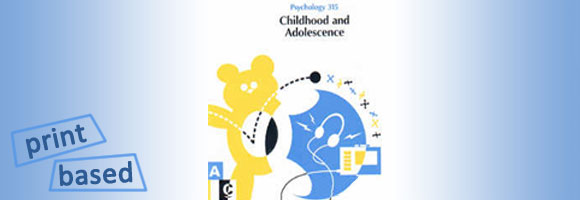
Mode of Delivery
This is a print-based, correspondence course.
Course Outline
- Four assignments
- Final examination
Course Description
Psychology 315: Childhood and Adolescence Human development from the preschool period through adolescence.
This course is designed to provide you with a background in theory and research in the cognitive, emotional, and social development of the child.
Prerequisites:
Psychology 100 or six credits of 200-level Psychology or permission of the instructor.
Course Objectives
This course has been designed to foster both breadth and depth in your understanding of current theoretical orientations and research findings on child development. Course lessons and assignments will give you an overview of present knowledge in the field and an appreciation of the research enterprise devoted to learning more about the developing child.
Course Overview
Psychology 315 emphasizes both a chronological and topical perspective on human development. The course text is organized chronologically and will provide you with a sense of the whole child as s/he develops over time. The course lessons and assigned readings, in contrast, are organized around specific topics and will afford more in-depth coverage of the development of processes such as language, moral reasoning, etc.
Course material consists of a course manual, a text and a set of readings and research articles. You access the assigned readings through the UBC ejournal collection.
Your study of the course material is organized into eight lessons.
- Lesson 1 will introduce you to the history of developmental psychology,as well as theories, issues, and research methods that shape the field.
- Lessons 2 to 4 cover cognitive and language development. Lesson 2 is devoted to a critical examination of the influential cognitive developmental theories of Jean Piaget and Lev Vygotsky. Lesson 3 continues your study of cognitive development by investigating recent theoretical approaches to cognitive development. The topic of how to define and assess children’s intellectual capacities is also dealt with in Lesson 3. Language development is the focus of Lesson 4.
- Lessons 5 to 8 deal with personal, emotional, and social development. Your study of these broad areas is organized into four lessons. Lesson 5 examines self and emotional development. Lesson 6 covers the development of moral reasoning and behaviour. Issues pertaining to the development of gender identity and gender roles are presented in Lesson 7. In Lesson 8, the influence of family life, peer groups, and social and cultural contexts is explored.
Course Work
There are four assignments in Psychology 315. All four assignments must be completed to receive credit for the course. The assignments include a variety of questions which require you to explain, apply and reflect upon course content. Assignment questions require you to demonstrate understanding of the course material and an ability to think creatively and critically about course content.
At the end of the course there is a final examination. You must pass the final exam with a minimum of 50% to receive credit for the course.
Course Grade
Your final grade will be determined as follows:
| Assignment One | 10% |
| Assignment Two | 12% |
| Assignment Three | 14% |
| Assignment Four | 14% |
| Final Exam | 50% |
|
Total
|
100% |
Textbooks
Berk, L. (2008). Infants, children and adolescents. 6th ed. Boston: Allyn and Bacon.
Please note: This is a print-based course, and you will also need to purchase a Learner Package (which includes the course manual) from the UBC Bookstore.
